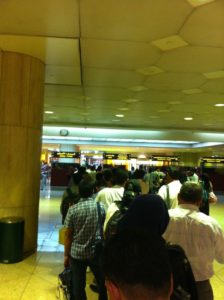The Kingdom of Saudi Arabia faces a 12.2 percent unemployment rate, equivalent to that of a nation in the throes of a recession, but the Kingdom’s GDP has quadrupled: from $143 billion in 1999 to $727 billion in 2012. Non-Saudi unemployment, however, has fallen about eighty percent, meaning the jobs this booming economy creates are going to expatriates and illegal workers. To remedy the situation, Saudi Arabia is enforcing a new labor policy called Nitaqat.
Implementing Change
In 2006, Saudi Arabia’s labor market was dominated by foreign workers. As such, the Ministry of Labor aimed to increase “Saudization” – or the concentration of Saudi citizens in the workforce – to a thirty percent compliance. These efforts, though, have consistently failed due to a lack of incentive. This has led to a crisis of illegal immigration, which Saudi Arabia hopes to combat with the implementation of a new labor policy: one that requires a set percentage of Saudi nationals on every company payroll as well as strict visa regulation.
A Breakdown of Requirements for Nitaqat
Compliance with Nitaqat requires the following of businesses with more than ten employees
- Small business of 10-49 employees must have a 5-24 percent Nationalization rate
- Medium businesses of 50-499 employees must have a 6-27 percent Nationalization rate
- Large businesses of 500-2,999 employees must have a 7-30 percent Nationalization rate
- Big businesses of 3000+ employees must have an 8-30 percent Nationalization rate
- 19 job titles including HR Manager, Receptionist, Female Sales Specialist, and Hotel Receptionist are reserved for Saudi Nationals only
- Employers must pay an income tax for foreign workers
Benefits of Compliance
There are four grades to Nitaqat compliance: Premium, Green, Yellow, and Red. A Premium rating means complete compliance and allows the company to hire whomever they choose (foreign or not). Premium level companies can also recruit foreign workers without having to apply for visas.
Green level compliance means a company can recruit foreign employees but must apply for a visa once every two months. They can also renew work permits of current foreign employees and transfer visas of employees working for Red or Yellow grade companies without the consent of their employer.
A Yellow level company cannot apply for or transfer new visas and may find their employees snatched up by a Green or Premium compliant company.
Red-level companies cannot renew work permits or file for new business branches.
Enforcement of Nitaqat
Twenty percent of Saudi companies are in the Red grade with 250,000 trade, industrial and service firms notified that their work permits would not be renewed without compliance, down from 340,000 firms a month ago. So far 200,000 illegal workers have been deported with 100 Indians leaving every day on exit-only visas.
Those found sheltering an illegal immigrant will be fined SR 30,000 (about US $8,000 − which multiples with each illegal found) as well as having their name published in the paper.
Nitaqat in Saudi Arabia’s Restaurant Industry
The deportation of laborers and high salary demands of Saudis means an increase in the price of goods and services in Saudi Arabia. This also means two million jobless expatriates returning to their home countries of India, Nepal, Pakistan, Yemen, and the Philippines, among others.
Foreign workers have until November 3rd, 2013 to regularize their immigration status or return home without penalty.

